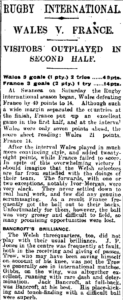In 1910, Billy Trew’s Welsh team kicked-off the defence of their Home Nations title with a game against France on New Year’s Day. A crowd of 12,000 turned up at St Helen’s to watch Wales win 49-14 in what was the first official fixture in the fully fledged Five Nations Championship.
Trew’s side had won the Grand Slam in 1908 and 1909 and were on a run of 10 successive victories. The win over the French made it 11, and they did it in real style, scoring nine tries and notching the highest score in the history of the tournament.

1910 Wales
@CF10 Trust
The French first entered the international arena in 1906 when they met Dave Gallaher’s original All Blacks on New Year’s Day 1906. That ended up in a 38-8 win for the New Zealand tourists, whose only defeat on that tour came against Wales in Cardiff.
England were the first of the Home Nations sides to meet them later in January in 1906 and Wales first faced them at Cardiff Arms Park on 2 March 1908. Wales scored nine tries that day, four of them by Cardiff wing Reggie Gibbs, in a 36-4 victory.

Reggie Gibbs
The French obviously loved playing on New Year’s Day because they played England on that day in 1908, Scotland in five times between 1913-1947 and Ireland six times between 1912-1948.
There had been nine tries in that first fixture and Wales increased that total to 11 on their first trip to France. That ended up in a 47-5 victory at Stade Colombes. No wonder, then, that the French skipper Gaston Lane pronounced before the third meeting in 1910 at St Helen’s that he expected Wales to win by 35 points.

In the end, he was bang on as Wales plundered 10 tries, three of them going to Gibbs as he made it seven in two matches against the French. The Cardiff flyer played in five games in the 11-match winning streak and scored nine tries.
His overall record for Wales saw him notch 17 tries in 16 games and he also scored another one in two games for the British & Irish Lions to take his Test tally to 18. His Five Nations record was 13 tries in 15 games.
While Gibbs was running in the tries – there were also two each for Swansea forward Ivor Morgan and London Welsh wing Hop Maddock – on that New Year’s Day, Swansea full back Jack Bancroft was writing his name into the record books. Following in the footsteps of his elder brother, Billy, he was a prodigious goalkicker for club and country and emerged from a battle with Cardiff’s Bert Winfield to become his nation’s leading full back.
Winfield made his Wales debut in a big win for Wales over Ireland in 1903 and was the man at full back in the 1905 victory over the All Blacks. He went on to score 50 points in his 15 caps, ending his Test career after the 1908 Grand Slam and win later that year over Australia.
A dislocated thumb cost him a start in the 1909 Home Nations championship, allowing Bancroft to make his debut in an 8-0 home win over England. Brother Billy had made his debut in exactly the same way 19 years earlier when Tom England cried off ahead of the game against Scotland in Cardiff.

England played 180 games for Newport over eight seasons, but never got another chance to play for Wales and ended his career without a coveted cap as Bancroft went on play in 33 consecutive internationals. Younger brother, Jack, went on to win 18 caps and score a world record 88 points.
He notched 22 of those points with 11 conversions in the 1909 Grand Slam campaign and then set a Welsh record 19 points in a game when the French arrived on his home pitch in 1910. As well as converting eight of the 10 tries, he also landed a penalty, to set a record that remained unequalled by another Welsh player until Keith Jarrett scored 18 points from full back on his debut against England in 1967.
The Welsh players were criticised in the press for “fooling about and not taking the game seriously”. They got their comeuppance in their next game two weeks later when England brought their winning run to an end with an 11-6 win in the first international match played at Twickenham.
The 49 points they scored on the New Year’s Day, however, remained a Five Nations record for 88 years before the 1998 Championship delivered three 50+ scores lines, two of which were against Wales. At Twickenham, England beat Rob Howley’s men 60-26 on 21 February, while on the same day the French won 51-16 over Scotland in Edinburgh.
France completed the Grand Slam with a crushing 51-0 triumph over Wales at Wembley to take ample revenge for their 1910 defeat. That said, a try was worth five points by then, so Trew’s score should be upgraded to 69!
Saturday, 1 January 1910 – Wales 49 – 14 France
St Helen’s, Swansea – Att: 12,000 – Referee: W Williams (England)
Scorers: Wales: Try: R Gibbs 3, I Morgan 2, H Maddock 2, J Jones, B Gronow; Cons: J Bancroft 8; Pen: J Bancroft. France: Tries: Lafitte, Mauriat; Con: Menrath; Pens: Menrath (2)
Wales: Jack Bancroft (Swansea); Hopkin Maddock (London Welsh), Jack Jones (Newport), Billy Trew (Swansea, captain), Reggie Gibbs (Cardiff); Dick Jones (Swansea), Dicky Owen (Swansea); Tom Evans (Llanelli), * Joe Pullman (Neath), Jim Webb (Abertillery), Cliff Pritchard (Newport), Dick Thomas (Newport), Phil Waller (Newport), * Ben Gronow (Bridgend), Ivor Morgan (Swansea)
France: R Menrath (SCUF); Maurice Bruneau (Bordeaux), Henri Houblain (SCUF), Marcel Burgun (Racing Club), Gaston Lane (Racing Club, captain); Claude Martin (Lyon), Alfred Maysonnie (Toulouse); Paul Mauriat (Lyon), Alphonse Masse (Bordeaux), Augustin Hourdebaigt (Bordeaux), Pierre Guillemin (Racing Club), Remi Lafitte (SCUF), G Thevenot (SCUF), Rene Boudreaux (SCUF), Joe Anduran (SCUF)







































